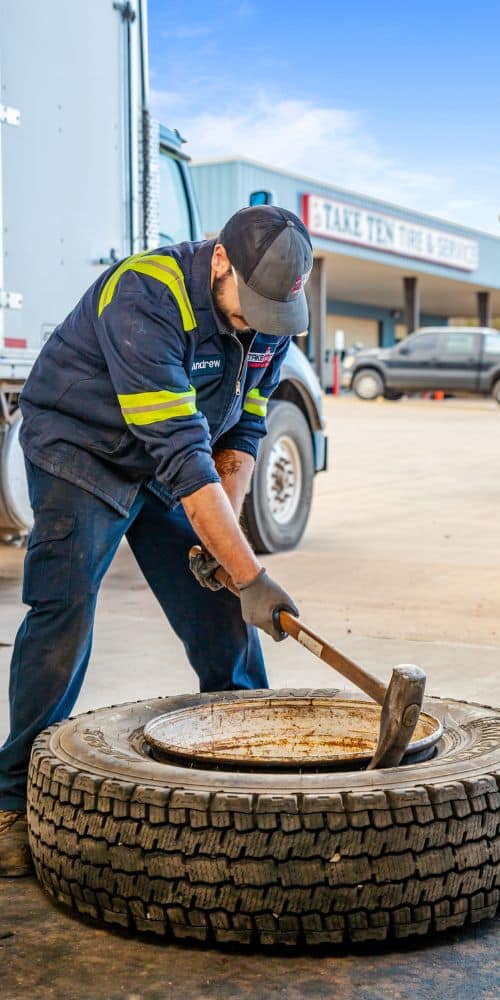The Link In Between Tire Solution and Fuel Performance
Performance in fuel intake is an extremely important worry for car proprietors looking for to optimize their driving experience. Among the various variables that influence gas efficiency, tire service sticks out as an important element that frequently goes neglected. The elaborate relationship in between tire upkeep and gas economic climate is a testimony to the complex workings of an automobile. By comprehending exactly how tire treatment directly affects the effectiveness of your vehicle, you can unlock a world of possibilities that not just boost efficiency however additionally contribute to set you back savings in the long run.
Significance of Correct Tire Rising Cost Of Living
Proper tire rising cost of living is an essential variable in taking full advantage of fuel performance and making sure optimum car efficiency. On the other hand, overinflated tires can lead to a harsher trip, uneven tire wear, and decreased grip - morris tire service.
Preserving the right tire pressure not just improves gas efficiency yet additionally boosts driving safety and security. Effectively filled with air tires give much better handling, braking, and overall efficiency when traveling. Furthermore, they add to extending the lifespan of the tires, saving you money in the future by lowering the regularity of replacements. On a regular basis checking and adjusting tire pressure, particularly before long trips, is an easy yet efficient way to enhance your car's fuel economic climate and make sure a smooth driving experience.
Influence of Tire Tread Deepness
Keeping the advised tire stress is crucial for optimum car efficiency and gas effectiveness; likewise, the step deepness of your tires plays an important function in making sure safety and security and traction on the road. Tire tread deepness directly influences the capability of your tires to hold the road surface, particularly in wet or slippery problems. As tires use down, their step depth reductions, impacting their capability to channel water away and maintain proper call with the roadway. The suggested minimum step depth is commonly 2/32 of an inch, but for enhanced security and efficiency, many specialists suggest changing tires before they reach this factor. Proper walk deepness not only ensures far better handling and stopping but likewise adds to fuel effectiveness by minimizing moving resistance. Frequently evaluating your tire walk depth and replacing tires when necessary is a simple yet effective way to promote both safety and security and official site fuel effectiveness when traveling.
Role of Wheel Placement in Effectiveness
Making certain precise wheel placement is vital for maximizing automobile efficiency and maximizing fuel economy. Proper wheel placement includes changing the angles of the wheels to producer specifications, guaranteeing that they are alongside each other and perpendicular to the ground. When wheels are misaligned, it can lead to irregular tire wear, raised rolling resistance, and reduced gas efficiency.

In addition, precise wheel alignment can additionally boost dealing with and stability, minimizing the quantity of power needed to maneuver the automobile (morris tire service). By minimizing unneeded friction and drag, correct wheel alignment plays an essential function in enhancing total vehicle performance and fuel economic situation. Regular wheel positioning checks and adjustments are necessary for maintaining ideal efficiency and taking full advantage of gas savings
Connection Between Tire Maintenance and MPG
A necessary aspect of enhancing gas efficiency in automobiles is the upkeep of tires and their direct effect on miles per gallon (MPG) Correct tire maintenance plays a vital role in making best use of fuel economic climate. look at this website On the various other hand, overinflated tires decrease the get in touch with spot with the roadway, leading to unequal wear and lowered gas effectiveness.
In addition, tire tread depth additionally influences fuel performance. Damaged footsteps decrease traction, specifically in damp conditions, forcing the engine to put in even more power to keep speed. This enhanced resistance results in greater gas intake. By guaranteeing tires have ample tread depth, motorists can boost both safety and fuel economic situation.
In significance, correct tire upkeep, consisting of visit monitoring tire pressure and tread depth, is directly linked to attaining optimal MPG. By integrating routine tire evaluations and maintenance into a vehicle care regimen, vehicle drivers can not just prolong tire life but also boost gas effectiveness, eventually saving cash and minimizing environmental impact.

Tips for Fuel-Efficient Tire Care
Given the crucial relationship between tire maintenance and fuel efficiency, executing efficient methods for enhancing tire treatment is crucial to improving general lorry efficiency. Turning tires at suggested intervals promotes even step wear, boosting fuel efficiency by ensuring all tires contribute equally to vehicle performance. By incorporating these fuel-efficient tire care pointers right into a regular maintenance timetable, vehicle drivers can maximize gas performance, minimize running costs, and prolong the life of their tires.
Verdict
By on a regular basis maintaining tires and adhering to fuel-efficient tire care ideas, drivers can enhance their automobile's efficiency and reduce fuel usage. It is necessary to prioritize tire upkeep to not just conserve cash on fuel costs however likewise to advertise total vehicle efficiency.